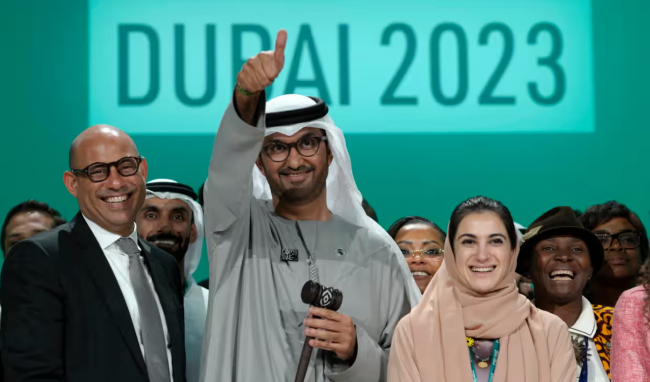Articles Menu

Dec. 13, 2023
As the leaders of the developed world hailed the Cop28 agreement to “transition away” from fossil fuels as historic, Indigenous people, frontline communities and climate justice groups rebuked the deal as unfair, inequitable and business as usual.
The global stocktake (GST) – and the entire UN talks – were dominated by whether or not agreement could be reached to phase out or phase down fossil fuels in order to curtail global heating.
Many developed countries publicly pushed hard for a phase-out of coal, oil and gas, but with caveats such as “unabated” or just coal, in the case of the US. In contrast, many in the developing world – despite their desire to see global temperatures limited to 1.5C (2.7F) above pre-industrial levels – consistently said that any commitment to move away from fossil fuels must be “fair, funded, and fast”, with the rich polluting countries transitioning first. In the end, rich countries with large oil and gas reserves were the clear winners.
The final deal fails to recognise the historic responsibility of the developed countries such as the US, UK, Canada and EU, which got rich by burning fossil fuels and are therefore most responsible for climate breakdown. Separate but connected to this issue of differentiated responsibility is the means of implementation: the obligation of developed countries to shoulder the burden and help developing countries to tackle and adapt to the climate crisis. Both are missing from the GST, which means the final deal lacks equity, according to climate justice advocates.
“Yet another disgraceful Cop where the wealthy polluters arrogantly shirk their responsibility, abandoning any pretence of fairness or justice,” said Wanun Permpibul, of Climate Watch Thailand. “They parade as climate champions, while our people and communities in the global south suffer the fallout of a crisis we did not create.”
Bareesh Chowdhury, of Bangladesh Environmental Lawyers’ Association and Friends of the Earth Bangladesh, said: “Without money and means of implementation, the places worst hit by climate change are left with only empty pockets and empty promises. We need billions of dollars, we’ve been given peanuts, and even more debt to boot.” Bangladesh is one of the countries most vulnerable to extreme weather and slow-onset impacts such as sea level rise.
The GST is the first assessment on the collective progress made on achieving the legally binding targets set out in the 2015 Paris accords, and crucially will also set the ambition for climate action going forward. The failure to connect GST targets and ambitions to funding means developing countries will need to begin working on their forthcoming national climate action plans for mitigation and adaptation without clear commitments on finance and implementation from developed countries.
“Developed countries basically got everything they wanted without giving up much,” said Meena Raman, a climate policy expert with Third World Network in Malaysia. “There is no equity here.”
The GST also kicks the door wide open for expensive, niche and largely ineffective abatement technologies such as carbon capture and storage, blue hydrogen, carbon markets and geoengineering with negligible safeguards, and which will probably lead to further land grabs, water scarcity and deadly pollution for mostly Indigenous and other communities of colour.
The Association of Small Island States, which includes some of the most climate-vulnerable places on the planet, said the GST contained a “litany of loopholes”.
Hindou Ibrahim, a Chad delegate, said: “They did not listen to what people are saying … [the GST] includes clear permission to companies to build infrastructures and extract minerals to carry out the just transition. Who is going to benefit from that? We cannot just give permission to companies, without including the language of safeguard and respect for the land and the people living around the resources.”
The GST also appears to give gas a lifeline, as it “recognises that transitional fuels can play a role in facilitating the energy transition while ensuring energy security” – which will surely delight the US and Russia, among other countries with massive reserves and expansion plans.
Tom Goldtooth, the director of the Indigenous Environmental Network and a Cop veteran, said: “We watched first-hand as the fossil fuel polluters and wealthy governments manipulated developing countries to undermine real action on climate change … [while] our strong messages of fossil fuel phase-out fell on deaf ears and instead more false solutions will accelerate climate change and deforestation … The UN climate change conference has failed humanity and Mother Earth.”
The GST dominated Cop28, but other crucial issues on the table included the global goal on adaptation (GGA), a collective commitment to drive political action and finance for adaptation on the same scale as mitigation, which has been blocked and delayed by developed countries for eight years. The African group had repeatedly said that progress on adaptation was a “life or death” issue for the continent, but they were left disappointed after a fortnight of tense negotiations.
“The text is very weak. Despite the many inputs and submissions we made, our views have not been integrated … and it’s been left open-ended,” said Kulthoum Omari, the African group’s GGA negotiator. “The language on means of implementation is still very weak and does not take into account the obligations under the Paris agreement.”
Cop deals are made by consensus – every nation has to agree before the gavel goes down. So why did the African nations, small island states and other countries who have signalled their discontent with the final outcome concede? According to Raman, a veteran Cop observer, it is hard for poor developing countries to push back and stand their ground when developed countries will not budge and threaten to walk away.
“In the end, the consensus is driven by the most powerful,” she said.
[Top photo: The UN climate chief, Simon Stiell (left); the Cop28 president, Sultan al-Jaber; and Hana al-Hashimi, the chief Cop28 negotiator for the UAE, pose for photos at the end of Cop28. Photograph: Peter Dejong/AP]